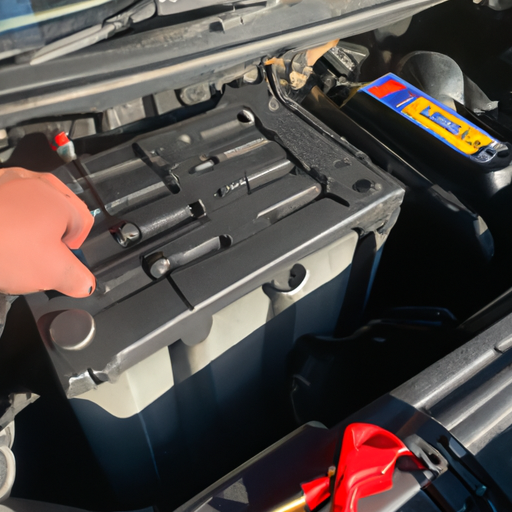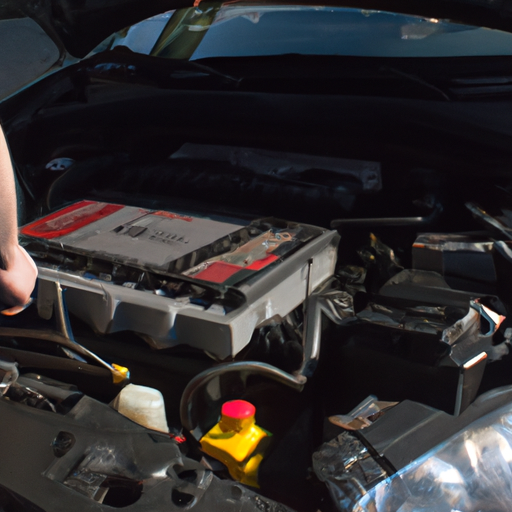Have you ever found yourself frustrated and wondering why your Jeep battery keeps dying? It can be quite a headache, not to mention inconvenient, to constantly deal with a dead battery. In this article, we will explore some of the common reasons why your Jeep battery may be dying, from electrical issues to improper maintenance. By understanding the potential causes, you’ll be better equipped to prevent future battery drain and keep your Jeep running smoothly.

1. Battery-related issues
Having a weak or old battery is one of the main reasons why your Jeep battery might keep dying. Over time, batteries lose their ability to hold a charge, and their overall capacity decreases. If you have been using the same battery for several years, it may simply be time for a replacement.
Battery drain is another common issue that can lead to a dead battery. This can be caused by a variety of factors, such as leaving the lights on or forgetting to turn off electronic accessories when the vehicle is not running. It is important to be mindful of these potential drains on your battery’s power and make sure to turn everything off before leaving your Jeep.
A faulty alternator can also cause your battery to die. The alternator is responsible for charging the battery while the engine is running, and if it is not functioning properly, your battery will not be receiving the necessary charge to stay fully powered. If you suspect that your alternator is the issue, it is best to have it checked and replaced if needed.
Corrosion on battery terminals can interfere with the connection between the battery and the vehicle’s electrical system. Over time, a build-up of corrosion can hinder the flow of power and eventually lead to a dead battery. Regularly cleaning the battery terminals and applying a corrosion inhibitor can help prevent this issue.
Loose or damaged battery cables can also cause power connectivity issues. If the cables connecting the battery to the vehicle are loose or damaged, it can result in poor electrical contact and a weakened battery. It is important to inspect the battery cables and ensure that they are securely fastened and in good condition.
2. Electrical system problems
Various electrical system problems can contribute to a Jeep battery repeatedly dying. Faulty fuses can interrupt the flow of electricity and prevent the battery from receiving a proper charge. Malfunctioning starters can struggle to initiate the engine, placing additional strain on the battery. Defective ignition switches can lead to power loss and drain the battery. Additionally, issues with the charging system, such as a faulty voltage regulator or wiring problems, can prevent the battery from receiving a sufficient charge. Electrical shorts or wiring problems can also cause the battery to die prematurely.
3. Parasitic drain
Parasitic drain refers to any continuous power consumption in your Jeep when the ignition is off. This can lead to a dead battery if left unchecked. One common cause of parasitic drain is interior lights or accessories being left on when the vehicle is not in use. It is important to make sure all lights and accessories are turned off before leaving the Jeep. Faulty car alarms or security systems can also contribute to parasitic drain. If you suspect a faulty alarm or security system is causing the drain, it may be necessary to have it repaired or replaced. Short circuits or electrical malfunctions can also cause parasitic drain and should be addressed by a professional. Aftermarket installations or modifications, if not properly installed, can introduce additional drain on the battery. Finally, electronically controlled modules or components that do not shut off as they should can also cause parasitic drain.
4. Extreme weather conditions
Extreme weather conditions, such as freezing temperatures, excessive heat, or high humidity, can all impact the performance of your Jeep’s battery. In freezing temperatures, the chemical reactions that occur within the battery are slowed down, resulting in decreased battery capacity and overall performance. Excessive heat can cause the battery to overheat and reduce its lifespan. High humidity or moisture can lead to corrosion on the battery terminals, resulting in poor electrical contact. It is important to be mindful of these weather conditions and take precautions to keep your battery in good condition.

5. Improper vehicle maintenance
Neglecting proper vehicle maintenance can also contribute to a battery repeatedly dying. Infrequent use or only taking short trips can prevent the battery from receiving a full charge, leading to its gradual depletion. It is important to regularly drive your Jeep for longer periods to allow the battery to fully charge. Lack of battery maintenance, such as not cleaning the terminals or checking the fluid levels, can also contribute to battery issues. Ignoring warning signs, such as slow engine cranking or dimming headlights, can lead to a dead battery. Incorrect battery installation, such as not properly connecting the cables or not securing the battery in place, can also cause power connectivity issues.
6. Mechanical issues
Various mechanical issues can result in a battery repeatedly dying. A faulty voltage regulator can prevent the battery from receiving a consistent charge from the alternator. A damaged or malfunctioning serpentine belt can cause the alternator to not function properly and therefore not charge the battery effectively. A malfunctioning cooling fan can result in excessive heat in the engine compartment, which can lead to overheating of the battery and reduced performance. Problems with the ignition system, such as a faulty ignition coil or spark plugs, can cause the battery to drain quicker than normal. Finally, a defective fuel pump or fuel delivery system can cause the engine to run inefficiently, placing extra strain on the battery.

7. Issues with the charging system
Issues with the charging system can directly impact the performance and lifespan of a battery. Alternator failure is a common issue that can prevent the battery from receiving a proper charge. A faulty voltage regulator can cause the alternator to overcharge or undercharge the battery, leading to battery failure. Wiring problems within the charging system can also interrupt the flow of power to the battery. Loose or damaged belts can prevent the alternator from properly functioning and charging the battery. Finally, a weak or malfunctioning battery itself can contribute to charging system issues and result in a repetitive cycle of battery failure.
8. Battery-related maintenance tips
To prolong the life of your Jeep’s battery and prevent recurrent battery failure, it is important to follow these battery-related maintenance tips:
- Regularly check the battery condition by visually inspecting for any signs of damage or leakage.
- Clean the battery terminals periodically to remove any corrosion buildup using a wire brush and a mixture of baking soda and water.
- Ensure proper cable connections by making sure the cables are securely fastened to the battery terminals.
- Test battery voltage regularly using a multimeter to ensure it is within the recommended range.
- Use a battery tender or maintainer to keep the battery charged when the vehicle is not in use for an extended period.

9. Steps to diagnose and fix the issue
If you are experiencing recurrent battery failure in your Jeep, you can take the following steps to diagnose and fix the issue:
- Perform a battery load test to check the capacity and overall health of the battery.
- Test the alternator and charging system to ensure they are functioning properly.
- Inspect and clean the battery terminals to ensure good electrical contact.
- Check for any electrical drain using a multimeter to identify any parasitic drain sources.
- If the issue persists or you are unsure how to proceed, it is best to seek professional help from a trusted mechanic or automotive technician.
10. When to replace the battery
There are several signs that indicate it may be time to replace your Jeep’s battery:
- Age of the battery: Most batteries have a lifespan of 3-5 years, so if your battery is approaching or exceeding this timeframe, it is likely due for a replacement.
- Frequent jump-starts: If you find yourself needing to jump-start your battery on a regular basis, it is a clear indication that the battery is no longer holding a charge and needs to be replaced.
- Inability to hold a charge: If your battery consistently dies shortly after being charged, it is a sign that it is losing its ability to hold a charge effectively.
- Low voltage or failing load test: A professional technician can test the voltage and load capacity of your battery to determine if it is performing below the required standards.
- Recurrent battery failure: If you have already replaced the battery multiple times and are still experiencing repetitive battery failure, there may be underlying issues with the electrical system or other components that need to be addressed.

